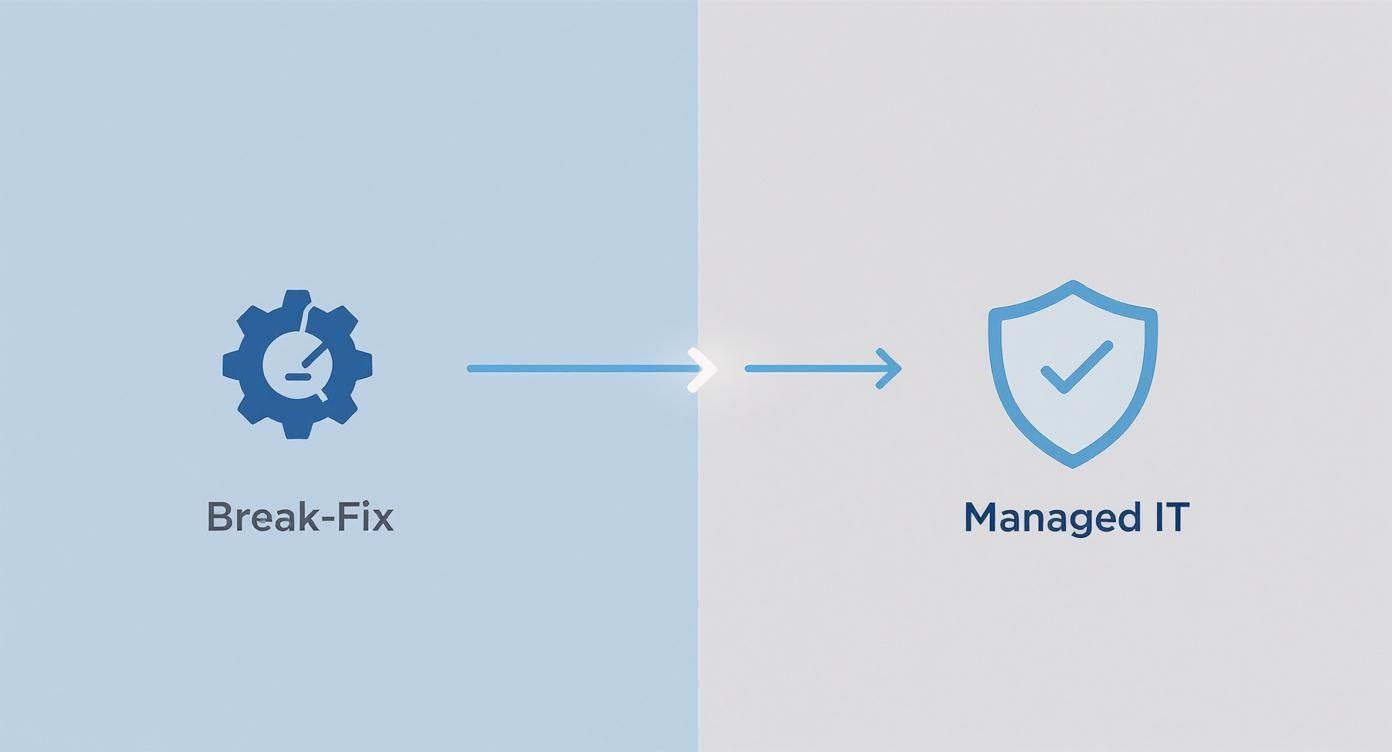What Is Managed IT Services? A UK Business Guide
Think of managed IT services as handing over the keys to your technology kingdom to a team of dedicated experts. Instead of you or your staff getting bogged down with IT problems, a specialist third-party company—known as a Managed Service Provider (MSP)—takes the reins. For a predictable monthly fee, they proactively monitor, maintain, and secure your entire IT setup, catching potential issues long before they can disrupt your business.
What Exactly Are Managed IT Services for UK Businesses?
Let's use a practical example. Imagine you're a partner at a busy law firm. Your primary focus is on client casework, court deadlines, and managing your legal team. The last thing you need is for your case management system to crash during a critical discovery phase.
The old way of doing things—the "break-fix" model—is like waiting for the system to fail before calling an expensive, emergency IT consultant. It’s chaotic, costly, and the downtime is a disaster for billable hours and client trust. You’re essentially paying for failure.
Managed services work completely differently. It’s like having a dedicated technology partner that regularly inspects and services your entire IT infrastructure. They spot the signs of an ageing server, replace a faulty network switch during non-business hours, and ensure your systems are running perfectly for the demanding workday. This allows you to focus on your clients, confident that the technology you rely on won't let you down.
A Partnership Built on Prevention
This is the fundamental shift: from reacting to problems to actively preventing them. An MSP isn't just a supplier; they become a strategic partner whose success is directly tied to yours. If your systems are down, their model isn't working. Their entire business is built on keeping your technology stable, secure, and efficient.
This partnership typically covers a whole range of critical functions:
- 24/7 Monitoring: Think of it as a constant health check for your technology. Your networks, servers, and devices are watched around the clock to spot any unusual activity that might signal trouble ahead.
- Proactive Maintenance: This is all the essential housekeeping that often gets overlooked. Regular software updates, security patches, and system tune-ups are handled seamlessly in the background.
- Layered Cybersecurity: In a world of constant threats, your MSP implements a robust, multi-layered defence to shield your business from malware, phishing scams, and other cyberattacks.
- Strategic Advice: A good MSP does more than just fix things. They provide expert guidance on your technology roadmap, helping you budget wisely and make smart investments that fuel your growth.
The real game-changer here is moving from unpredictable, lump-sum costs for emergency repairs to a flat, manageable monthly fee. This gives UK businesses a predictable budget, turning IT from a potential financial headache into a reliable strategic asset.
Consider a busy accountancy firm in Dorset during the peak of tax season. A server crash under the old break-fix model would be a catastrophe—frantic calls, astronomical emergency call-out fees, and days of lost billable hours. With an MSP on board, proactive monitoring would have flagged the server's declining performance weeks earlier, allowing for maintenance or replacement with zero disruption. Business continues, deadlines are met, and a crisis is completely avoided.
What’s Really Included in Managed IT Support?
Think of a managed IT service agreement as more than just an on-call helpline. It’s a genuine partnership, a strategic plan designed from the ground up to keep your business technology running without a hitch. By understanding the key pieces of this puzzle, you can start to see just how much value it brings to the table, ensuring your business gets the robust protection and efficiency it deserves.
At its core, great managed support rests on a few fundamental pillars. These include constant, round-the-clock monitoring of your systems, iron-clad cybersecurity, and all the essential maintenance that often gets overlooked, like proactive patch management and vulnerability resolution. It’s about keeping everything secure, updated, and stable.
This infographic does a great job of showing the shift in thinking. We’re moving away from the old "wait for it to break, then fix it" chaos and towards a far smarter, proactive managed IT framework.

The big takeaway here is that managed IT turns technology from an unpredictable expense into a reliable, strategic asset that actually fuels your business’s growth and keeps the doors open.
Proactive Network Monitoring
This is your 24/7 watchtower. Instead of you calling in a panic when a server goes down, your Managed Service Provider (MSP) is already watching. They use sophisticated tools to monitor the health and performance of your network, servers, and computers in real-time.
This constant vigilance means they spot the small warning signs long before they snowball into business-stopping disasters. For example, a financial advisory firm in London is approaching its end-of-quarter reporting period. Monitoring tools flag that a server’s memory is constantly running dangerously high. The MSP can then schedule an upgrade overnight, preventing a crash that would have otherwise brought client reporting to a standstill.
Robust Cybersecurity Measures
In a world filled with digital threats, strong security isn't just a nice-to-have; it's essential, especially for professional services firms handling sensitive client data. A good MSP delivers a multi-layered defence to guard your most valuable information. We're not just talking about basic antivirus software here. This is a complete security strategy that includes:
- Firewall Management: Building and maintaining a strong digital perimeter to block unauthorised access.
- Threat Detection: Actively hunting for and neutralising malware, ransomware, and sneaky phishing attempts.
- Security Patching: Making sure every piece of software is updated to close the latest security loopholes hackers might exploit.
This means your business gets enterprise-grade protection, managed by specialists whose entire job is to stay one step ahead of the cybercriminals.
A solid managed IT partnership brings incredible peace of mind. You know a dedicated team is always working behind the scenes to protect your business from the financial and reputational fallout of a breach.
Dependable Data Backup and Disaster Recovery
Ask yourself this: what would you do if all your critical business data disappeared tomorrow? Whether it’s due to a hard drive failure, a ransomware attack, or even simple human error, the result could be catastrophic. That’s why a rock-solid backup and disaster recovery plan is a non-negotiable part of any managed service.
This isn’t just about copying files. It's about ensuring your data is backed up regularly, automatically, and securely to a separate, off-site location.
For instance, an architectural practice in Bristol suffers a major server failure right before a client deadline. With a managed backup solution already in place, they can restore their project files and complex CAD drawings in minutes, not days. The crisis is averted, the project stays on track, and the client relationship is preserved. If you want to make sure your business is just as prepared, it’s worth learning more about how a proper managed backup service builds that kind of resilience.
Why UK Businesses Are Making the Switch to Managed IT
The move towards managed IT services isn't just a fleeting trend; it’s a smart, strategic shift that's delivering real, tangible results for businesses across the UK. One of the biggest drivers behind this change is financial. Instead of facing unpredictable, often massive, capital expenses for IT, companies can switch to a fixed monthly operational cost. This simple change allows SMEs to budget with pinpoint accuracy, avoiding the nasty surprise of a huge repair bill that can throw an entire quarter's financial plan off course.
This kind of predictability is gold in the current economic climate. The UK's managed IT services market was valued at around £15.35 billion in 2023 and is on track to hit £28.29 billion by 2032. That's not just a small uptick; it’s a clear signal that business owners are realising proactive IT management is fundamental to staying stable and competitive.
But it goes deeper than just managing costs. Partnering with a Managed Service Provider (MSP) gives you an immediate competitive advantage. You get access to a whole team of specialists—cybersecurity professionals, cloud architects, network engineers—for what's often less than the salary of a single senior in-house IT person.
Gaining Enterprise-Level Expertise
Consider a growing consultancy in Manchester preparing for a major project launch. Instead of going through the slow and costly process of hiring more IT staff, their MSP can step in right away. They have the expertise to scale up the firm's cloud infrastructure almost overnight, ensuring that collaboration tools and client portals remain fast and responsive under heavy load. That’s the power of having top-tier talent on tap when you need it most.
This level of expertise is also crucial for navigating the tangled web of UK and EU regulations.
For businesses like solicitors or accountancy firms, staying compliant with GDPR isn't just good practice—it's the law. A good MSP is more than just a tech provider; they're a compliance partner, putting the right security measures in place to protect sensitive client data and help you avoid crippling fines.
Turning IT into a Strategic Asset
When all is said and done, bringing in a managed IT partner is about changing how you view technology. It stops being a reactive cost centre and becomes a proactive tool that helps you grow your business. When your systems are secure, running smoothly, and properly aligned with your company's objectives, you've built a solid foundation for success.
Here are a few of the key advantages:
- Enhanced Security: Your MSP is always on guard, with continuous monitoring and advanced threat protection to shield your business from the constant risk of cyberattacks. This defence is vital for keeping your doors open, and a robust strategy for IT disaster recovery is a key part of that protection.
- Improved Productivity: When an expert team is handling all the IT headaches, your staff can get back to what they do best. No more time wasted wrestling with tech glitches means better focus, higher efficiency, and greater output from everyone.
- Strategic Scalability: Your business isn't static, and your IT shouldn't be either. An MSP makes sure your technology grows with you, whether that means supporting a new office, launching a new product, or expanding your team.
How Managed IT Underpins Hybrid and Remote Work
The move towards flexible working isn't just a trend; it's a fundamental shift in how businesses operate. But this new freedom brings a host of new IT headaches. Suddenly, you're not just managing one office network—you're dealing with dozens of home networks, personal devices, and varying internet speeds. Without a solid plan, productivity dips and security risks skyrocket.
This is exactly where managed workplace services come into their own. They're built from the ground up to tackle the challenges of a scattered workforce. By providing the right technology and security protocols, a managed service provider (MSP) makes sure your team can work effectively and securely, no matter where they log in from.

Creating a Secure and Standardised Digital Workplace
One of the most powerful tools in the hybrid working toolkit is Virtual Desktop Infrastructure (VDI), often delivered as a managed service. Think of it as giving every employee a standardised, secure company computer that they can access from any device, anywhere. A professional services firm, for example, could have staff dotted all over the UK. Instead of trying to manage countless different laptop configurations and unsecured home Wi-Fi, the MSP can roll out an identical virtual desktop to every single person.
This solves several problems in one go:
- A Uniform Experience: Everyone gets the same high-performance desktop with the right software and permissions. No more "it works on my machine" issues.
- Centralised Security: Because all your company data lives in a secure data centre, not on individual laptops, the risk from a lost or stolen device is massively reduced.
- Simplified Management: IT support becomes a breeze. The MSP handles all the updates, patches, and software rollouts centrally, which saves huge amounts of time and effort.
The real beauty of managed workplace services is that an employee's location no longer dictates their security or productivity. Your business standards are maintained, whether someone is at their office desk or their kitchen table.
The numbers back this up. The UK's managed workplace services market is expected to grow at an annual rate of 10.6% through 2035, a clear sign that businesses are relying on these solutions to keep their remote teams efficient. You can check out the latest market growth insights for a deeper dive.
For many businesses, these services are no longer a "nice-to-have" but an operational necessity. You can discover more about why hosted desktops are shaping the future of remote work and giving companies the agility they need to thrive.
Choosing the Right Managed IT Partner for Your Business
Picking a Managed Service Provider (MSP) is one of the most significant technology decisions your business will face. This isn't just about hiring a supplier; it’s about bringing a strategic partner into the fold who will be woven into the fabric of your daily operations. Get it right, and you can supercharge your growth. Get it wrong, and you're in for a world of frustration and expensive downtime.
Your search has to go deeper than a simple price check. You need a provider with a solid track record, especially one that understands the ins and outs of your industry, whether that's professional services, finance, or manufacturing.

Key Evaluation Criteria
One of the first things you need to put under the microscope is the Service Level Agreement (SLA). This isn't just paperwork; it's your guarantee. It should spell out exactly what they're responsible for, the standards you can expect, and how quickly they’ll respond when you need them. If an SLA is vague, that’s a massive red flag.
It also pays to find a provider with a strong local presence. The UK’s managed services market varies greatly between its economic hubs, from the corporate demands of London to the tech scenes in Manchester and Birmingham. A local partner just gets it—they understand the specific challenges and environment you operate in. You can find out more about the UK's regional managed services market trends on Renub Research.
Next, look for concrete proof that they can walk the talk:
- Technical Expertise: Does their team hold the right certifications? Are they genuinely experienced with the software and systems your business depends on every day?
- Client Testimonials: What are their current clients saying? Don’t just look for good reviews; look for comments that highlight their reliability and proactive approach.
- Case Studies: Ask to see real-world examples of how they’ve helped businesses like yours solve a problem or hit a specific target.
The best partnerships are built on proactive support, not reactive fixes. Your aim should be to find a provider who stops problems from happening in the first place, rather than one who just cleans up the mess afterwards.
When you're meeting potential partners, don't hold back. Ask the tough questions and dig beyond the glossy sales pitch. A provider worth their salt will welcome the detailed questions and give you clear, confident answers that prove they know their stuff and are genuinely invested in your success.
Common Questions About Managed IT Services
Even with all the benefits laid out, it's natural for business owners in the UK to have a few questions before committing. Let's tackle some of the most common concerns we hear, helping you get a clearer picture of whether managed IT is the right move for your company.
Isn't Managed IT Too Expensive for My Small Business?
This is probably the number one question we get, and it’s a fair one. The reality, however, is that for most small and medium-sized businesses, managed IT is surprisingly cost-effective.
Think about it this way: instead of paying a hefty full-time salary for one in-house expert, you get access to a whole team of specialists for a predictable monthly fee. This model also shields you from sudden, budget-wrecking repair bills and, crucially, minimises the astronomical cost of business downtime. It effectively turns your unpredictable IT spending into a stable, manageable operational cost.
A professional Managed Service Provider acts as a strategic partner, not a replacement for your leadership. You retain full control over your IT strategy while they handle the complex, day-to-day technical execution.
Will I Lose Control Over My IT Systems?
Absolutely not. It's a common misconception that outsourcing your IT means handing over the reins completely. A quality MSP works with you, not instead of you.
You’re always in the driver’s seat for big-picture strategic decisions. The MSP provides the technical know-how to manage your technology day-to-day, freeing you and your team to focus on what you do best. Through regular, transparent reporting and clear communication, you'll always be in the loop and in command.
The transition itself is handled with care. Any professional provider will use a structured onboarding process—starting with a thorough audit and a phased migration—to ensure the switch is smooth and causes minimal disruption.
Ready to turn your technology into a reliable asset? For over 30 years, SES Computers has delivered expert managed IT support to businesses across Dorset, Hampshire, and Wiltshire. Discover our tailored IT solutions and secure your business’s future today.